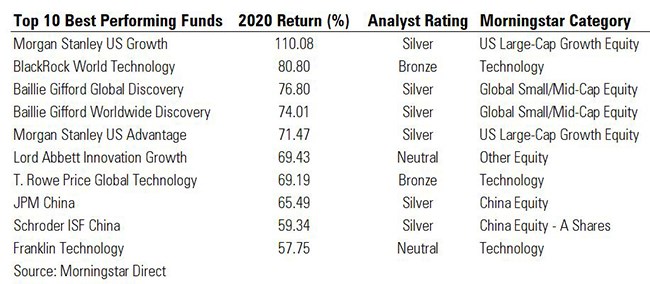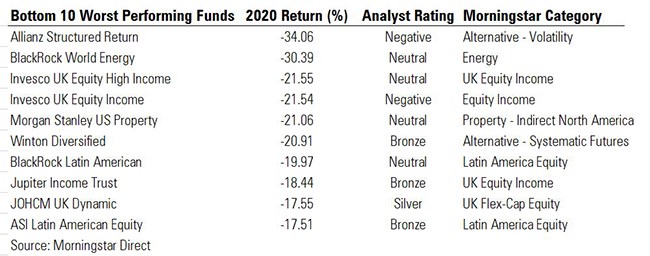
US, tech and China funds excelled in 2020 and the rest trailed in their wake, with UK equity income and large-cap funds clustered at the bottom of the table with double-digit losses.
In 2020, the best-performing fund rated by Morningstar analysts was up 110% while the worst was down 34%. The figures stand in stark contrast with 2019, when the top fund was up 35% and the worst was off 7%, according to Morningstar Direct data.
Since the coronavirus crash in March, the trend of tech and China outperformance became clear in Morningstar’s monthly fund round-ups, except in November’s rally when unloved value, UK and energy funds staged a comeback.

Top Performing Funds of 2020
Just one fund rated by Morningstar managed to double in 2020, Silver-rated Morgan Stanley US Growth, which returned a staggering 110%, beating its benchmark, the Russell 100 Growth index, by nearly 80% and the US Large-Cap Growth category by a similar margin.
Unsurprisingly, the fund’s portfolio is stuffed with remote working tech stocks such as Zoom (ZM) and Slack (WORK), and stay-at-home winners Amazon (AMZN) and music streaming service Spotify (SPOT). Its biggest holding is mobile payments firm Square (SQ), whose shares are up 250% on the back of the e-commerce boom, while the second biggest holding, Zoom, was up nearly 400% last year.
Morgan Stanley US Advantage, whose portfolio also contains the likes of Square and Amazon, also makes it into the top five with a gain of 71% for the year. In second place with a gain of 80% is another technology fund, BlackRock World Technology, which has a Morningstar Analyst Rating of Bronze. Apple (AAPL) is the top holding in the fund, followed by Microsoft (MSFT) and Tesla (TSLA), whose shares soared from $86 to $705, a gain of over 700% (Morningstar analyst Dave Whiston recently wrote about Tesla’s prospects here, while columnist John Rekenthaler looked at the electric car maker’s entry into the big league here). PGIM Jennison US Growth is the only Gold-rated fund to make it into the top 20, with a gain of over 50%.
China is well represented in the top 20 best-performing funds, with Silver-rated JPM China the best of the bunch with a gain of 65%, just ahead of Schroder ISF China, which has a Bronze Rating. China was one of the countries to make the quickest recovery from coronavirus and its equity market has followed suit; analyst Lorraine Tan looks at the country’s prospect’s here. In total, four of the top 20 best-performing funds are from the Morningstar China Equity category – and including funds from the Greater China Equity and China Equity A Shares, all are up more than 25% this year, with exception of Silver-rated Fidelity China Focus, which fell by nearly 4% in 2020.
Away from China and US technology, Japanese funds make an appearance in the top 30, with Silver-rated Comgest Growth Japan the best performer with a gain of over 40%, outpacing the benchmark Topix index by more than 30%.

Worst Performing Funds of 2020
Negative-rated Allianz Structured Return stands out among the worst performers of 2020 with a loss of 34% for the year. The only UK fund under Morningstar coverage in the Alternative – Volatility category, it was downgraded in the wake of the March market crash to Negative. “The latest failure in risk management led to painful losses during the recent market sell-off,” says Morningstar analyst Francesco Paganelli, adding that the “potential risk of substantial losses during quick and severe market drops” is a common feature of these type of funds.
BlackRock World Energy is the second worst performing fund of the year with a loss of more than 30%. With oil prices collapsing in the early part of 2020 and climate change concerns accelerating, energy stocks have been among the worst performers – and many of these oil giants have compounded investor pain by announcing dividend cuts. One of these is five-star rated Royal Dutch Shell (RDSB), a mainstay of many UK equity income funds, which represent six out of the 20 worst performing funds in 2020. Neutral-rated Invesco UK Equity High Income is the worst performing fund of that cohort, and the second worst performer of the year, with a loss of over 20%. The fund’s manager, Mark Barnett, left Invesco in May 2020.
UK Funds in the Doldrums
Some 9 of the 20 worst performing funds are focused on the UK. The prospect of a no-deal Brexit, now averted, has weighed heavily on UK shares for a number of years – as well as the concentration of value, energy and high income stocks in UK indices. There are tentative signs of a turnaround for these managers however: four UK small and mid-cap funds are in the top five best performers in December, including Silver-rated TB Amati UK Smaller Companies and BlackRock UK Smaller Companies, both with gains of around 10% in the last month of the year.
JPM Korea Equity fund was the best performer in December with a gain of 10.5% and a chunky gain of 36.48% for the year as a whole, putting it in the top 40 of funds overall. Like China, South Korea managed to get coronavirus infections under control quickly and its tech-focused economy has prospered. Funds that have had a bad year but a good December include BlackRock Latin America, which is down 20% in 2020 but up 8% in the last month of the year; likewise Jupiter India eked out a gain of 1% for the year but was up 8.5% in December. Emerging markets have had a bruising year but the weakness of the dollar in recent weeks has helped their cause going into 2021.



























